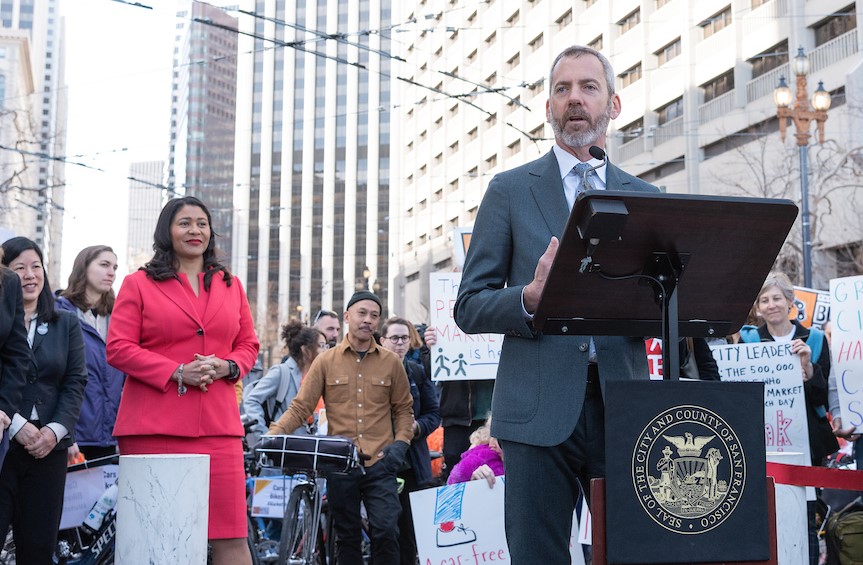By
 Jeffrey Tumlin addresses participants and attendees, including Mayor London Breed, at the Better Market Street opening day ceremony on Jan. 29.
Jeffrey Tumlin addresses participants and attendees, including Mayor London Breed, at the Better Market Street opening day ceremony on Jan. 29.
This week we are profiling several agency leaders, including Director of Transportation Jeffrey Tumlin, on their thoughts about this month’s Pride celebrations and their experience with equity and transit in San Francisco.
Our agency has participated as a sponsor and with a parade contingent in San Francisco’s world-renown Pride celebration for many years. Last week Director of Transportation Jeffrey Tumlin logged in with our communications team to share some of his background and perspective on the 50th anniversary of Pride.
The questions and answers have been edited for length.
Q: What does the 50th anniversary of Pride mean to you?
A: I think the 50th anniversary of Pride is interesting in the context of the George Floyd anti-police brutality protests that are happening in San Francisco. Pride started as a riot. We celebrate the Stonewall uprising, but we forget that years before that the Compton’s Cafeteria Riot happened right here in San Francisco. This was also a bunch of courageous, angry transgender people who felt so hopeless about not being respected and loved in society and so hated by the establishment, that they had nothing to lose and fought back against police brutality. We need to remember that, and we need to take the lessons of our fight for gay equality and understand our responsibility to join our brothers and sisters in fighting for equality and racial equality.
Q: In what ways do you feel the equity work at our agency serves those who identify as LGBTQ+ colleagues?
A: Our equity work at the SFMTA has both an internal focus and an external focus. All our equity work is a call to action. It recognizes our history of not only not valuing certain types of people but also actually undermining their rights and opportunities to serve. So, equity work is not only about treating people equally, it’s about correcting for past injustice. It’s remarkable that even here in San Francisco there’s still so much work we need to do.
Q: In what ways can or does transit in general serve or strengthen the LGBTQ+ community?
A: Transit is very gendered. Transportation is very gendered. If we design our mobility system to serve cisgender young white men, we serve cisgender young white men. If we design our mobility spaces to serve women, people with disabilities and people of color, we end up serving everyone. The design of mobility systems can make us all feel like we are welcome and that we also have responsibilities to uphold in public to make everyone else feel welcome. So, a question that I always ask myself is, “Would my trans friends feel safe here?”
Q: And in answering that, what looks different? How do you recognize that?
A: That’s something I try to ask other people questions about. I’m queer, but I’m also an affluent middle-aged white guy. There are perspectives where I always need to go talk to other people in order to better understand. That’s part of why equity work inside the agency is important for us to deliver quality service to our customers outside the agency.
I know a bit about how to design spaces that are welcoming for women and children. I know a bit about how to design services that are inclusive of transgendered people, but I always need to check with the experts. “Hey, I think I’ve got this right. Is this?” And often I’ve missed some critical detail because it’s not part of my lived experience.
The factors that make a space trans-friendly or queer-friendly or welcoming to women and children are very complex. There aren’t simple rules, but studies have shown if a few younger women start biking, particularly women of color, that tells others that this is an appropriate activity for everyone. And suddenly it changes attitudes.
Q: You’ve mentioned that you see a strong connection between the AIDS and the COVID-19 public health crises. Can you discuss how those are related?
A: It’s been strange having a seat at the table, as the head of a city department, quietly listening to conversations about how the city is responding to COVID-19. I’ve been able to observe that all the institutional mechanisms set up by the Bay Area county health directors back in the 80s to respond to the AIDS health crisis were still there. It’s why the county health directors made the decisions they did and Mayor Breed acted as quickly as she did. Those decisions saved thousands of lives, particularly compared to regions that waited just a couple of weeks longer.
Published June 29, 2020 at 09:19AM
https://ift.tt/2YGNafG
Comments
Post a Comment